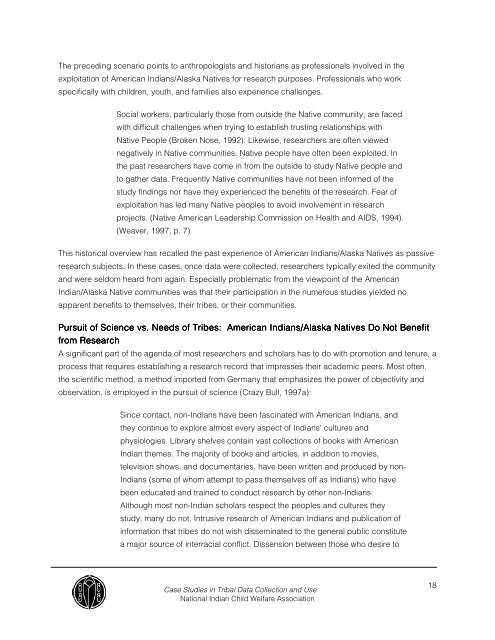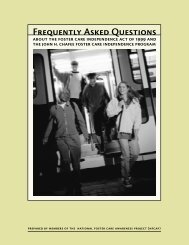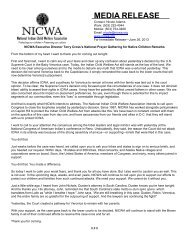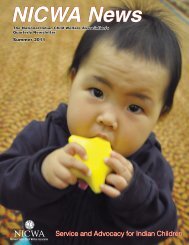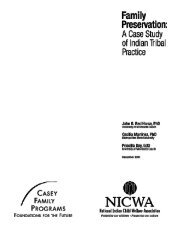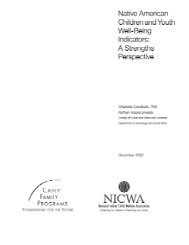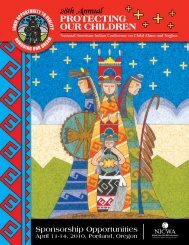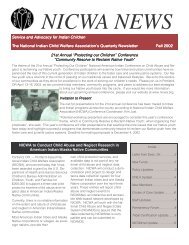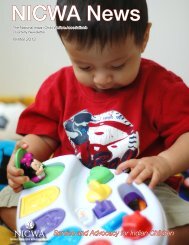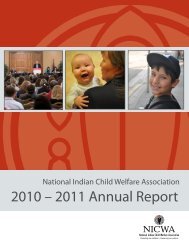case studies in tribal data collection and use - National Indian Child ...
case studies in tribal data collection and use - National Indian Child ...
case studies in tribal data collection and use - National Indian Child ...
You also want an ePaper? Increase the reach of your titles
YUMPU automatically turns print PDFs into web optimized ePapers that Google loves.
The preced<strong>in</strong>g scenario po<strong>in</strong>ts to anthropologists <strong>and</strong> historians as professionals <strong>in</strong>volved <strong>in</strong> theexploitation of American <strong>Indian</strong>s/Alaska Natives for research purposes. Professionals who workspecifically with children, youth, <strong>and</strong> families also experience challenges.Social workers, particularly those from outside the Native community, are facedwith difficult challenges when try<strong>in</strong>g to establish trust<strong>in</strong>g relationships withNative People (Broken Nose, 1992). Likewise, researchers are often viewednegatively <strong>in</strong> Native communities. Native people have often been exploited. Inthe past researchers have come <strong>in</strong> from the outside to study Native people <strong>and</strong>to gather <strong>data</strong>. Frequently Native communities have not been <strong>in</strong>formed of thestudy f<strong>in</strong>d<strong>in</strong>gs nor have they experienced the benefits of the research. Fear ofexploitation has led many Native peoples to avoid <strong>in</strong>volvement <strong>in</strong> researchprojects. (Native American Leadership Commission on Health <strong>and</strong> AIDS, 1994).(Weaver, 1997, p. 7)This historical overview has recalled the past experience of American <strong>Indian</strong>s/Alaska Natives as passiveresearch subjects. In these <strong>case</strong>s, once <strong>data</strong> were collected, researchers typically exited the community<strong>and</strong> were seldom heard from aga<strong>in</strong>. Especially problematic from the viewpo<strong>in</strong>t of the American<strong>Indian</strong>/Alaska Native communities was that their participation <strong>in</strong> the numerous <strong>studies</strong> yielded noapparent benefits to themselves, their tribes, or their communities.Pursuit of Science vs. Needs of Tribes: American <strong>Indian</strong>s/Alaska Natives Do Not Benefitfrom ResearchA significant part of the agenda of most researchers <strong>and</strong> scholars has to do with promotion <strong>and</strong> tenure, aprocess that requires establish<strong>in</strong>g a research record that impresses their academic peers. Most often,the scientific method, a method imported from Germany that emphasizes the power of objectivity <strong>and</strong>observation, is employed <strong>in</strong> the pursuit of science (Crazy Bull, 1997a):S<strong>in</strong>ce contact, non-<strong>Indian</strong>s have been fasc<strong>in</strong>ated with American <strong>Indian</strong>s, <strong>and</strong>they cont<strong>in</strong>ue to explore almost every aspect of <strong>Indian</strong>s’ cultures <strong>and</strong>physiologies. Library shelves conta<strong>in</strong> vast <strong>collection</strong>s of books with American<strong>Indian</strong> themes. The majority of books <strong>and</strong> articles, <strong>in</strong> addition to movies,television shows, <strong>and</strong> documentaries, have been written <strong>and</strong> produced by non-<strong>Indian</strong>s (some of whom attempt to pass themselves off as <strong>Indian</strong>s) who havebeen educated <strong>and</strong> tra<strong>in</strong>ed to conduct research by other non-<strong>Indian</strong>s.Although most non-<strong>Indian</strong> scholars respect the peoples <strong>and</strong> cultures theystudy, many do not. Intrusive research of American <strong>Indian</strong>s <strong>and</strong> publication of<strong>in</strong>formation that tribes do not wish dissem<strong>in</strong>ated to the general public constitutea major source of <strong>in</strong>terracial conflict. Dissension between those who desire toCase Studies <strong>in</strong> Tribal Data Collection <strong>and</strong> Use<strong>National</strong> <strong>Indian</strong> <strong>Child</strong> Welfare Association18


